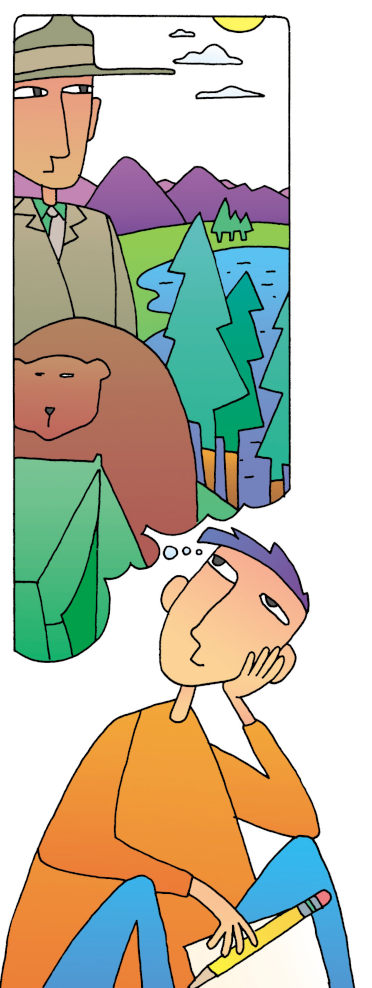
Page 13
One Writer’s Process
Have you heard of Yellowstone? It’s the oldest national park in the world, with mountains and lakes and plains. You can see bison and wolves there. You can also see geysers.
The whole time you stand in Yellowstone, you stand inside a supervolcano!
Gabe learned all that on a family trip one summer. When he returned to school, he was excited to share what he learned. In writing about his discoveries, he learned even more.
In this chapter, you can follow Gabe’s journey to Yellowstone, and his journey from a writing idea to a full-formed essay!
What’s Ahead
WE 014
Page 14
Prewriting
Understand the Assignment 🟪 To get started, Gabe used the PAST strategy to name the main parts of his assignment. Doing this helped to keep him on track.
Purpose: To inform
Audience: Students in the school
Subject: A natural wonder
Type: Explanatory essay
Select a Topic 🟪 Gabe thought that Yellowstone was the most wonderful place he had been, so he knew what to write about.
Write Freely 🟪 Gabe started by writing freely about his topic.
My family went to Yellowstone, and we saw lots of geysers and hot springs and mud pots. Those are all because Yellowstone is one big volcano. A supervolcano! It had one of the largest eruptions of all time. The ground under it is full of magma that wants to burst up, but the crust keeps it down. That’s why all the water bubbles up there. It’s boiling hot and full of sulfur. . . .
Gather Details 🟪 Gabe learned a lot about supervolcanoes. He created a cluster to show what he learned.
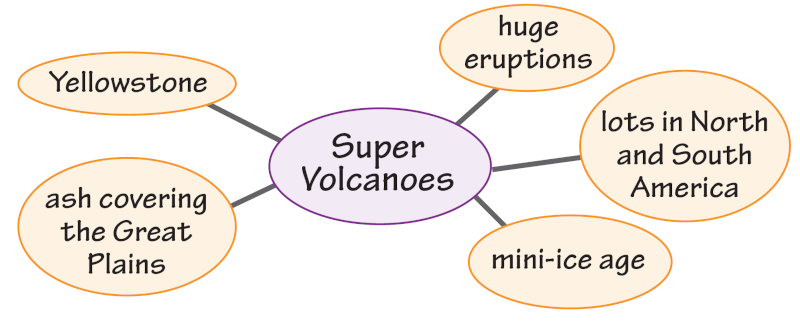
WE 015
Page 15
Learn More 🟪 Gabe also collected more information. These notes record details he learned from two other sources.
from “What is a supervolcano?” (USGS)
— has had eruption of magnitude 8 on the Volcano Explosivity Index (VEI)
— has ejected more than 240 cubic miles of material
— Toba had the biggest eruption, followed by two at Yellowstone. (Include public domain graphic.)
from “How dangerous are supervolcanoes?” (NatGeo)
— California’s Long Valley, Japan’s Aira Caldera, Indonesia’s Toba, and New Zealand’s Taupo
— some form on hotspots, some subduction zones
— 1815 explosion of Mount Tambora caused “Year Without a Summer” with crop failure and famine
Create a Focus 🟪 Next, Gabe wrote a sentence that focused on the central idea of his essay. (He knew his focus might change as he worked.)
Visitors to Yellowstone National Park stand inside a supervolcano.
Organize the Draft 🟪 Gabe then outlined the main points and details that supported his focus.
I. Supervolcanoes erupt at 8 on the explosivity index.
A. They send 240 cubic miles of debris into the sky.
B. Yellowstone last erupted 640,000 years ago.
C. Scientists say it is due for another eruption.
II. The world has many supervolcanoes.
A. Taupo in New Zealand erupted 26,000 years ago.
B. The Toba Caldera in Sumatra erupted 75,000 years ago, a double-supervolcano.
C. Argentina, Chile, Bolivia, Canada, and the United States hold many supervolcanoes.
III. Yellowstone eruption would be catastrophic.
A. Montana, Idaho, and Wyoming would be hit first.
B. Ash would blanket the ground to Louisiana.
C. A mini-ice age would last for a decade.
I. Supervolcanoes erupt at 8 on the explosivity index.
A. They send 240 cubic miles of debris into the sky.
B. Yellowstone last erupted 640,000 years ago.
C. Scientists say it is due for another eruption.
II. The world has many supervolcanoes.
A. Taupo in New Zealand erupted 26,000 years ago.
B. The Toba Caldera in Sumatra erupted 75,000 years ago, a double-supervolcano.
C. Argentina, Chile, Bolivia, Canada, and the United States hold many supervolcanoes.
III. Yellowstone eruption would be catastrophic.
A. Montana, Idaho, and Wyoming would be hit first.
B. Ash would blanket the ground to Louisiana.
C. A mini-ice age would last for a decade.
WE 016
Page 16
Writing
Gabe wrote his first draft, introducing the topic, providing his focus, and giving main points. He didn’t worry too much about errors.
Super Volcano
Visitors to Yellowstone National park often report seeing grizzly bears, elk, bison, and even wolves. They watch Old Faithful shoot superheated water hundreds feet into the sky. Focus Statement Most amazing of all those visitors stand inside a super volcano.
Definition A super volcano forms when a huge column of magma rises up the mantle of the earth but can’t break threw the crust. The hot spot pushes upward, causing the ground to rise. If pressure continues to build, the volcano can erupt explosively Supporting Details Such an eruption would throw at least 240 cubic miles of earth and ash into the air! Yellowstones last big eruption happened 640,000 ago, but scientists say it’s due to erupt again.
Examples The North Island of New Zealand has a super volcano called Taupo. The center of the volcano, its caldera, is now Lake Taupo. About 75,000 years ago, the Toba Caldera . . .
WE 017
Page 17
Revising
Gabe revised his first draft to make his writing clearer and more complete. He used this revising checklist. Gabe also asked a classmate to read over his first draft and provided revision suggestions, seen on the left:
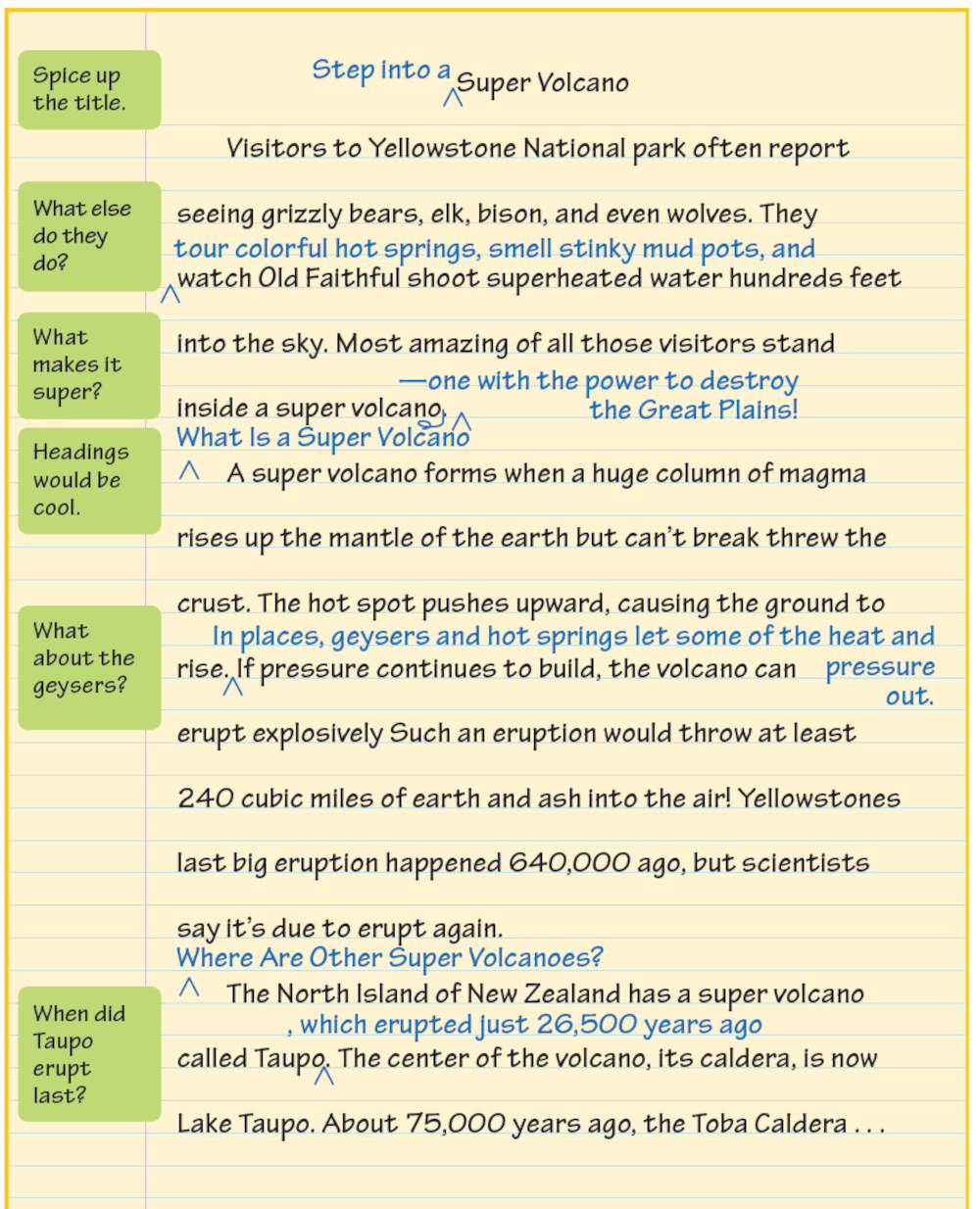
WE 018
Page 18
Editing and Proofreading
Next, Gabe and a partner checked his writing for errors. They used this editing and proofreading checklist to fix errors in spelling, capitalization, punctuation, and much more.
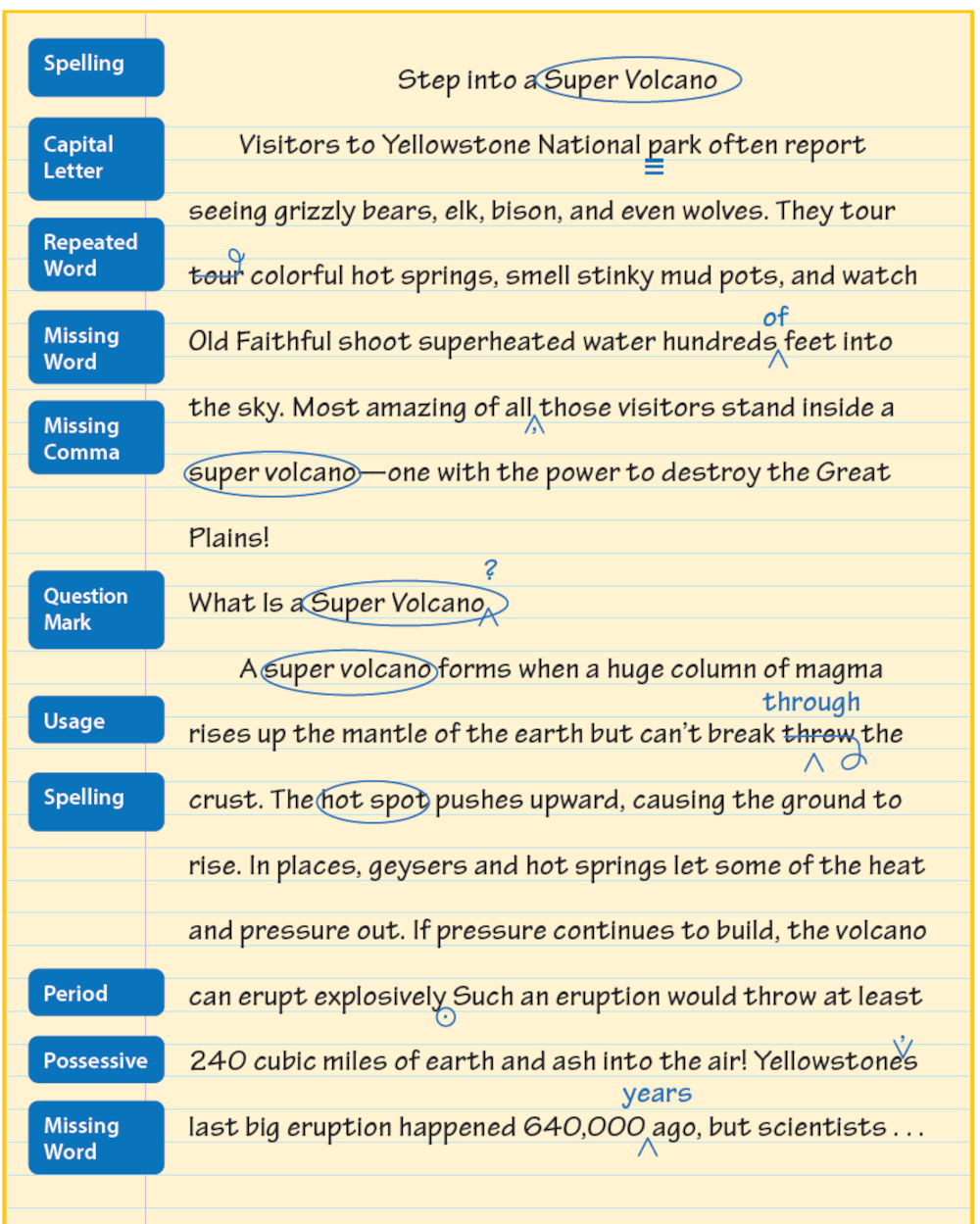
WE 019
Pages 19-20
Publishing
Gabe produced a neat final copy of his essay and proofread it one final time before printing it out. He made his essay clear and accurate and added a public-domain image that helps to explain his ideas.
Step into a Supervolcano
Beginning
The writer hooks the reader's interest and leads to the focus statement. Visitors to Yellowstone National Park often report seeing grizzly bears, elk, bison, and even wolves. They tour colorful hot springs, smell stinky mud pots, and watch Old Faithful shoot superheated water hundreds of feet into the sky. Most amazing of all, those visitors stand inside a supervolcano—one with the power to destroy the Great Plains!
Headings show the structure of ideas. What Is a Supervolcano?
A supervolcano forms when a huge column of magma rises up the mantle of the earth but can’t break through the crust. The hotspot pushes upward, causing the ground to rise. In places, geysers and hot springs let some of the heat and pressure out. If pressure continues to build, the volcano can erupt explosively. Such an eruption would throw at least 240 cubic miles of earth and ash into the air! Yellowstone’s last big eruption happened 640,000 years ago, but scientists say it’s due to erupt again.
Where Are Other Supervolcanoes?
Middle Paragraphs
The writer explains different parts of the topic. The North Island of New Zealand has a supervolcano called Taupo, which erupted just 26,500 years ago. The center of the volcano, its caldera, is now Lake Taupo. About 75,000 years ago, the Toba Caldera in Sumatra had an enormous eruption. It threw out more material than two other supervolcanoes combined. Argentina, Chile, Bolivia, and Canada also have supervolcanoes. The United States has five supervolcanoes, though the Yellowstone Caldera is the most active.
A public-domain image helps explain the topic. 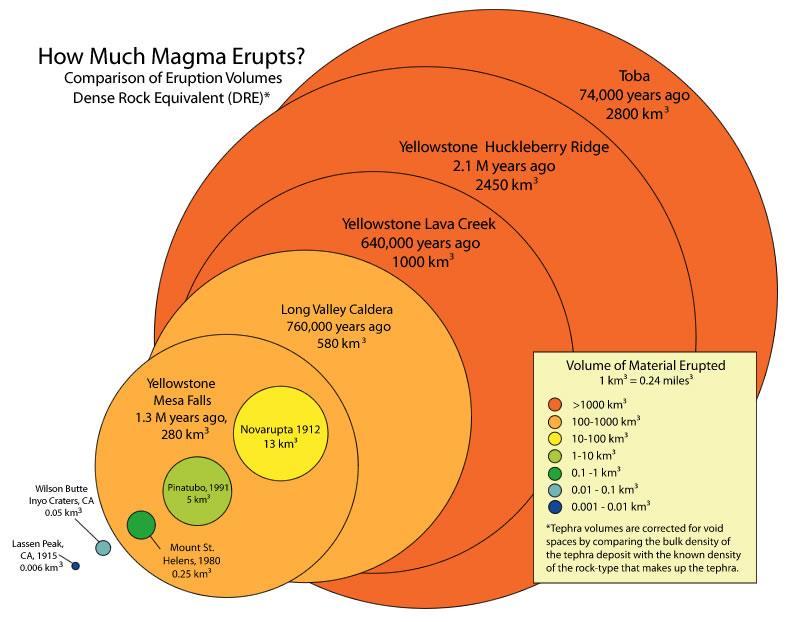
How Bad Would a Yellowstone Eruption Be?
Yellowstone probably won’t erupt in the next thousand years, but a big eruption would have worldwide effects. . . .